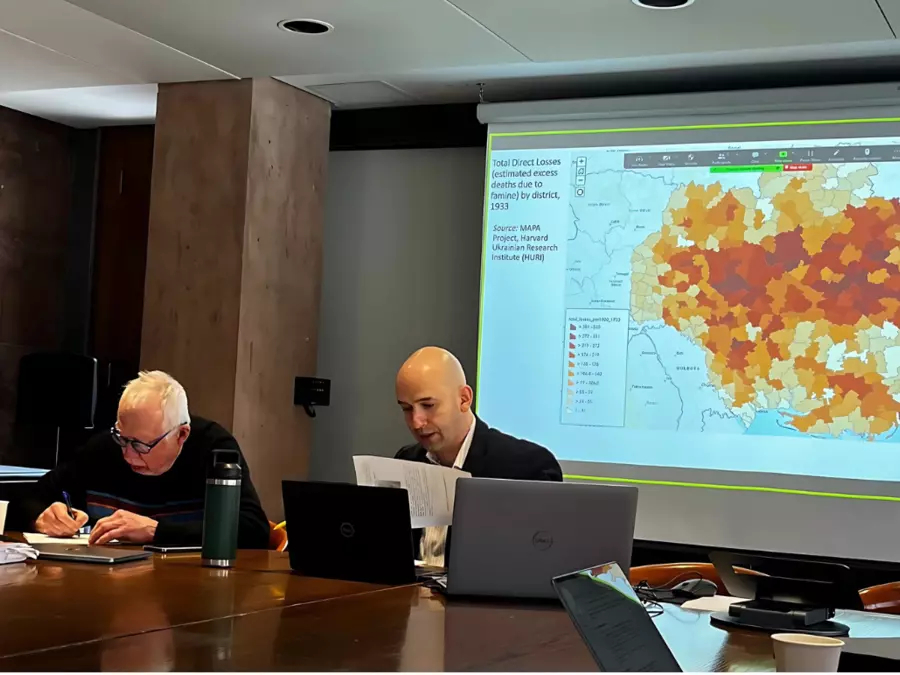
New Perspectives from Research Symposium on the Holodomor
On March 21, 2025, the Petro Jacyk Program for the Study of Ukraine at CEES hosted a research symposium, New Perspectives on the Holodomor: Demographic, Economic, and Security Dimensions. Organized by Dr. Andrey Shlyakhter, the Petro Jacyk Post-Doctoral Fellow in Ukrainian Politics, Culture and Society, the event gathered specialists in Soviet economic history, demography, and security whose work contributes to a deeper understanding of the causes and consequences of the Ukrainian famine of 1932-34. The symposium was divided into three panels, each focusing on distinct aspects of the famine.
The first session, “Foreign Threat and the Ukrainian Famine: Realty, Perception, Manipulation, Impact,” debated the degree to which the spectre of foreign threat shaped Soviet policy in the runup to and during the famine. Chaired by Frank Sysyn (University of Alberta), the panel featured presentations by David Shearer (University of Delaware), Hiroaki Kuromiya (Indiana University), and Andrey Shlyakhter, with David Stone (US Naval War College) serving as discussant. The presenters examined interwar Soviet security policy and its relationship to the Holodomor through the lenses of intelligence, military strategy, repression, and border control.
The second session, “The Causes of Ukrainian Famine Mortality, 1932-33,” was devoted to the article of the same name by Andrei Markevich, Natalya Naumenko, and Nancy Qian, published in the Review of Economic Studies (September 2024). Dr. Naumenko (George Mason University) presented her team’s groundbreaking research demonstrating pervasive anti-Ukrainian bias in famine mortality, after which Stephen Wheatcroft (University of Melbourne) and Oleh Wolowyna (University of North Carolina – Chapel Hill) provided responses. Olga Andriewsky (Trent University) served as chair. The discussion centered on the interpretation of the findings and their implications for assessing the intentions behind faminogenic policies.
The third session, “Bread, Debt, and Death: Urban Provisioning, Foreign Exports, and the Ukrainian Famine,” featured presentations by Friedrich Asschenfeldt (Princeton University) and Stephen Wheatcroft (University of Melbourne), with responses by Oleh Wolowyna and Bohdan Klid (Holodomor Research and Education Consortium). Alison Smith (University of Toronto) served as chair. The panel examined how key choices made by Soviet leaders in the realms of foreign finance and domestic distribution precipitated the famine and shaped the geography of starvation.
Dr. Shlyakhter, whose own research seeks to explain why more people survived the famine along Soviet Ukraine’s western border, and explores the implications of this disparity for understanding the Holodomor and the Soviet system, commented: “The symposium was an extraordinary opportunity to learn from leading experts in the salient themes. The presentations and discussions also served to integrate the study of the Ukrainian famine into the mainstream study of Soviet history – a crucial and ongoing effort."
The symposium was sponsored by the Holodomor Research and Education Consortium at the Canadian Institute of Ukrainian Studies, University of Alberta; the Petro Jacyk Program for the Study of Ukraine; the Centre for European and Eurasian Studies; the John Yaremko Chair of Ukrainian Studies at the University of Toronto; and the Department of History.

